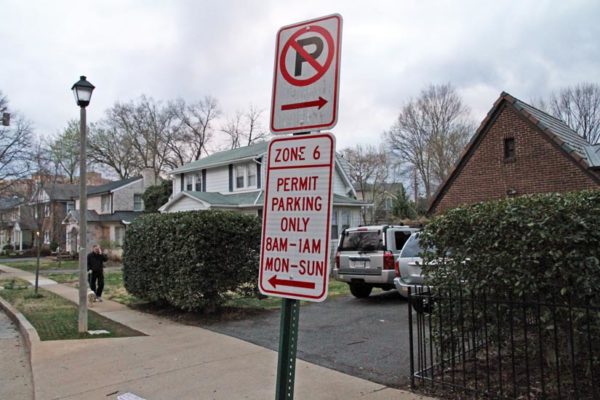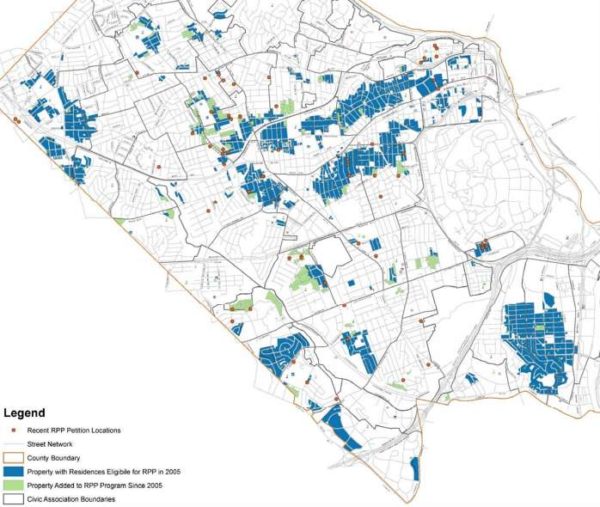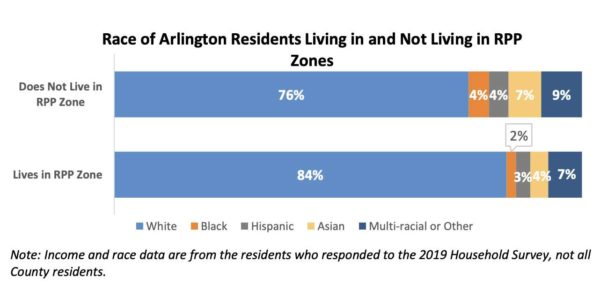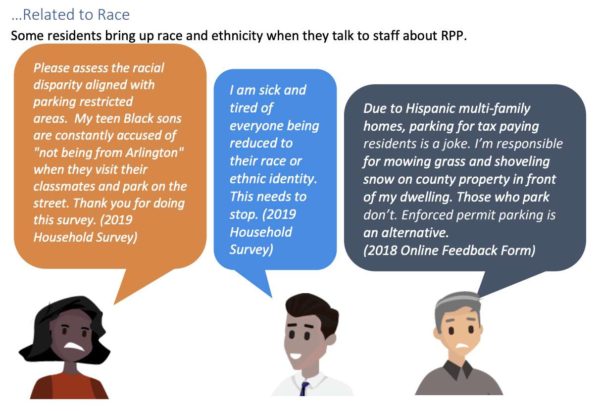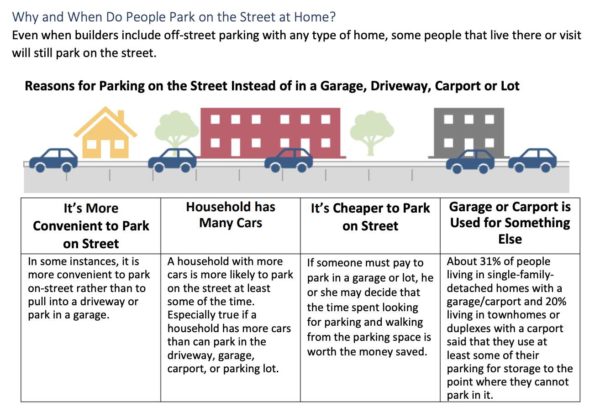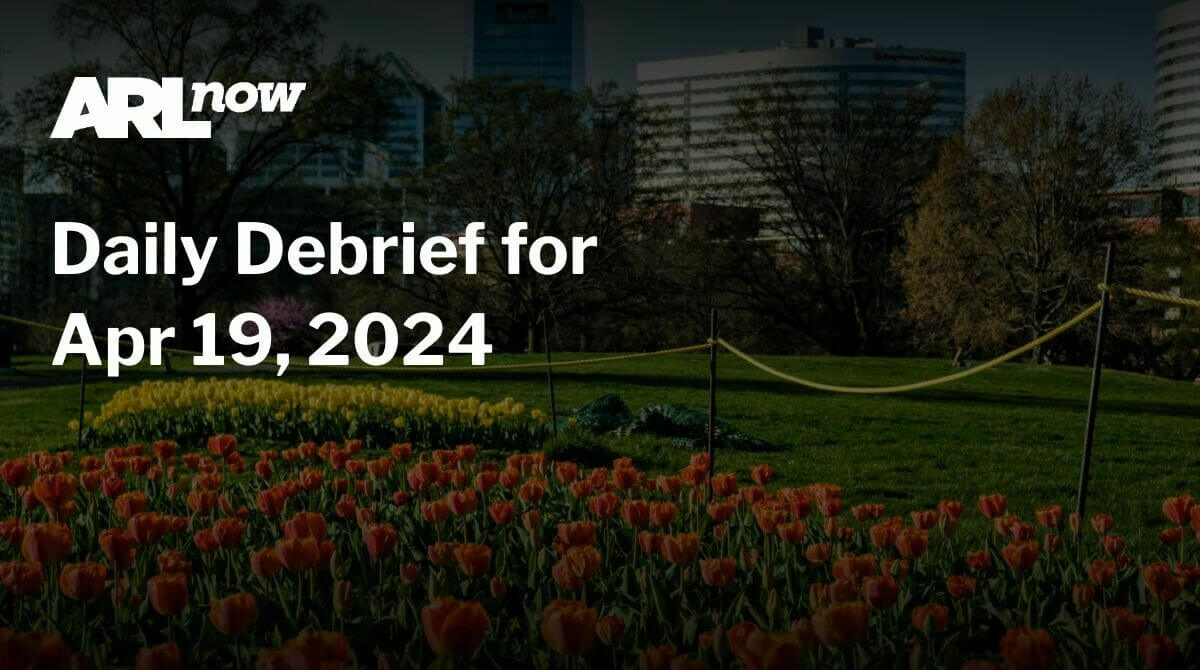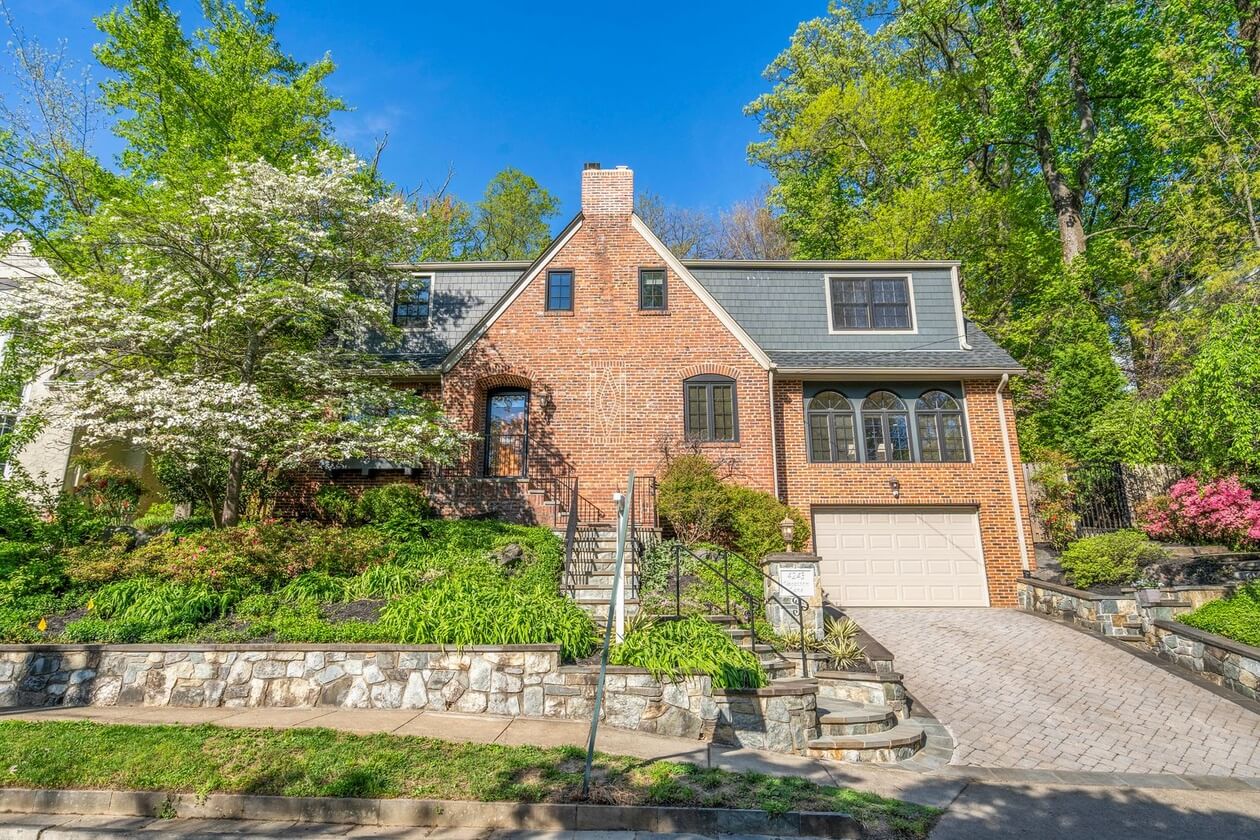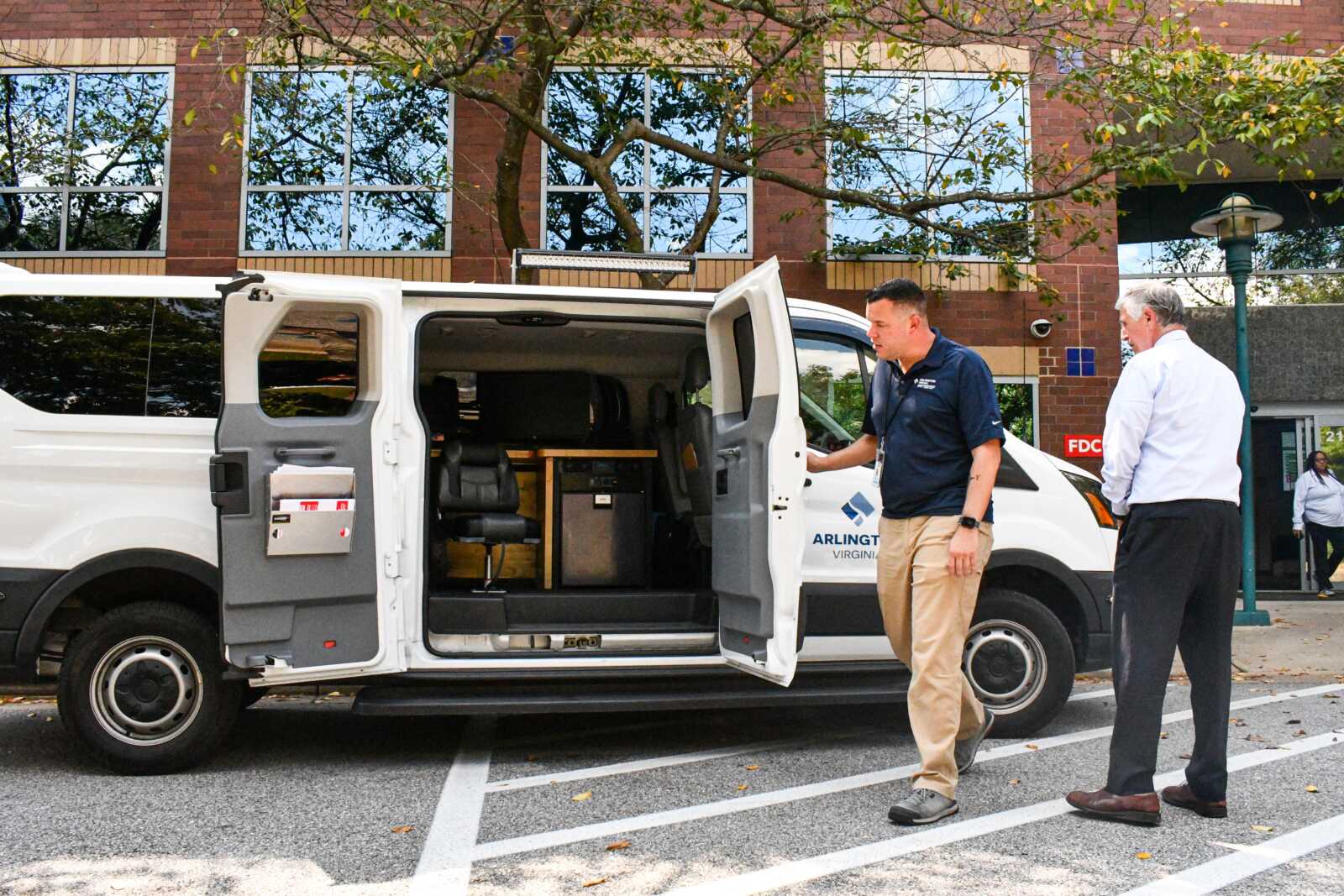If you live in the right type of home in the right place, Arlington County will reserve street parking for you and your neighbors for much of the day.
But the Residential Permit Parking program is under review and a county staff recommendation on whether it should continue as currently conceived is expected soon.
The review has dragged on since it was launched in 2017, when the county put a moratorium on approving new permit parking zones, and was further delayed by the pandemic. County officials, however, now say they’re going to skip holding more public engagement meetings on the topic, either virtual or in-person, and move forward with the aim of County Board action in January.
Meetings had been planned for the spring, but were cancelled due to health concerns. A county spokeswoman says county staff decided against additional meetings due to equity concerns.
“Staff looked into holding the dialogues online but decided that holding online dialogues would not be an adequate replacement,” Arlington Dept. of Environmental Services spokeswoman Kathryn O’Brien told ARLnow. “There are tools for holding the dialogues online, but there are challenges to bringing together a diverse group of Arlingtonians for a meeting of three hours or more online.”
“An inclusive group of participants at the dialogues would be especially necessary because residents are divided on the RPP program,” she continued. “The County could have waited until in-person public meetings resume but continuing to delay the RPP Review increases the chance that decision-makers will see the feedback currently captured as out-of-date. Delaying the review also continues the moratorium on petitions for new or modified restrictions.”
There are few issues that raise local passions like parking, and the RPP program has sharply divided residents.
The program started in the early 1970s, when Aurora Highlands residents successfully petitioned the Arlington County Board to approve restrictions that would keep Crystal City commuters from parking in the neighborhood. The county won a Supreme Court challenge to the restrictions and gradually expanded the program to other neighborhoods.
Eventually, residents of new apartment buildings and condos were excluded from the program, as access to street parking became a sticking point with neighbors of proposed new developments. And neighborhoods well away from Metro stations and office districts started getting approved for restrictions.
The tide started to turn against the program a few years ago, as more neighborhoods sought to add parking restrictions, raising questions about the fairness of reserving increasingly large portions of the public road network for the vehicles of certain residents.
Last year, the County Board repealed some RPP restrictions in the Forest Glen and Arlington Mill neighborhoods, which apartment residents said made it difficult to park in the neighborhood for those who do not work a traditional 9-5 job. The decision was contentious, however.
A recently-released report on the RPP review process includes comments from surveys that further reflect the divide.
“It doesn’t seem fair to me who is eligible now. Higher density homes with less curb space should be eligible as single family homes,” said one resident quoted in the report.
“The County should NOT make apartment, condo, and townhouse residents eligible for parking permits because it will encourage more cars and further overcrowd parking resources,” said another.
The report notes that the population eligible for RPP skews whiter and more affluent than those who are not eligible. White residents are 84% of the population in RPP zones, compared to 76% of the population outside of RPP zones. Households making $200,000 or more are 32% of the population in RPP zones, compared to 19% in non-RPP zones.
Furthermore, only 25% of those enrolled in RPP live in multifamily buildings like apartments and condos; by comparison, 71% of Arlington’s overall population lives in multifamily housing.
In one section of the report, quotes from survey takers on the topic of race are printed.
“Due to Hispanic multi-family homes, parking for tax paying residents is a joke,” one person is quoted as saying. “I’m responsible for mowing grass and shoveling snow on county property in front of my dwelling. Those who park don’t. Enforced permit parking is an alternative.”
Another quote asserts that minority residents who are eligible for RPP parking are frequently accused of parking illegally by other residents.
“Please assess the racial disparity aligned with parking restricted areas,” said the survey taker. “My teen Black sons are constantly accused of ‘not being from Arlington’ when they visit their classmates and park on the street.”
After the report was released, a resident who supports the RPP program and was taking part in the community feedback emailed ARLnow to accuse county staff of bias against the program.
“The people who oppose the existing RPP have their comments in happy blue and orange colors, and people who support the existing RPP have their comments in scary grey and black colors, including one comment that is explicitly racist,” the resident said of the report.
The resident went on to suggest that, while the county staff recommendation is not currently known, it appears likely to encourage more parking in driveways, or even perhaps the construction of new driveways.
The report notes that “about 95% of all single-family detached households in the RPP program have at least some amount of parking in a driveway, carport, or garage.” It further says that “residents are more likely to park on street if they have RPP restrictions, regardless of the type of housing in which they live.”
The staff recommendation, sure to be a hot topic of local discussion, is expected to be published any day now. Last November, County Board member Christian Dorsey said the discussion about any proposed RPP changes is “going to be a doozy.”
O’Brien said there will be numerous opportunities for public feedback between the release of the recommendations and when the County Board considers the final RPP proposal for approval.
In early October, staff will publish a draft policy based on the last three years of community engagement and study, and then conduct additional public engagement to gather community feedback on these changes. To help residents understand the draft policy, staff will hold an online question-and-answer session. More information will be shared once dates are finalized.
In November, staff will present the draft policy to the Tenant-Landlord Commission, Transportation Commission, and Planning Commission before going to the Board to Request Authorization to Advertise a Public Hearing on changes to the County Code and supporting policy. The public is invited to attend these meetings. The January 2021 Transportation and Planning Commission meeting is also another opportunity to comment on proposed changes.
In December, all are invited to watch and comment on changes to the RPP program at the December 2020 Board Meeting. The January 2021 Board Meeting will be the place to share any other support or concerns about changes to the RPP Program before the Board makes its decisions about what changes to adopt.
Recent Stories

For Immediate Release
Progress for All Announces Inaugural Black Men Vote Virtual Town Hall
Date: April 19, 2024
Contact: Marc M. M. Peters

The Award is available to recent high school graduates and non-traditional students (see the application for more details). Each recipient may be awarded up to $20,000. Applicants are required to submit an online application form as well as a short video application.
The applicant must be an Arlington resident pursuing a career or technical education accredited program, within a high-growth career, that will be completed within two years.
The careers and programs include, but are not limited to:
-
Audio, Video, and Sound Engineering Technicians
-
Broadcast Technicians
-
Commercial Drivers
-
Culinary Arts
-
Early Childcare Education
-
Healthcare
-
Information Technology and Computer Science
-
Manufacturing and Skilled Trades (including welding, auto and aviation mechanics and technicians)
-
Public Safety
ACFCU’s Free Homebuying 101 Webinar: Steps to Getting Pre-Approved
Are you ready to jump into homeownership, or have you started considering it but don’t know where to start?
Financial preparation is key when thinking about purchasing your first home and the first step to getting pre-approved. Join ACFCU for
Sweeney Todd
A victim of a gross injustice that robbed him of his wife and child, Sweeney Todd sets about exacting a terrible revenge on society.


